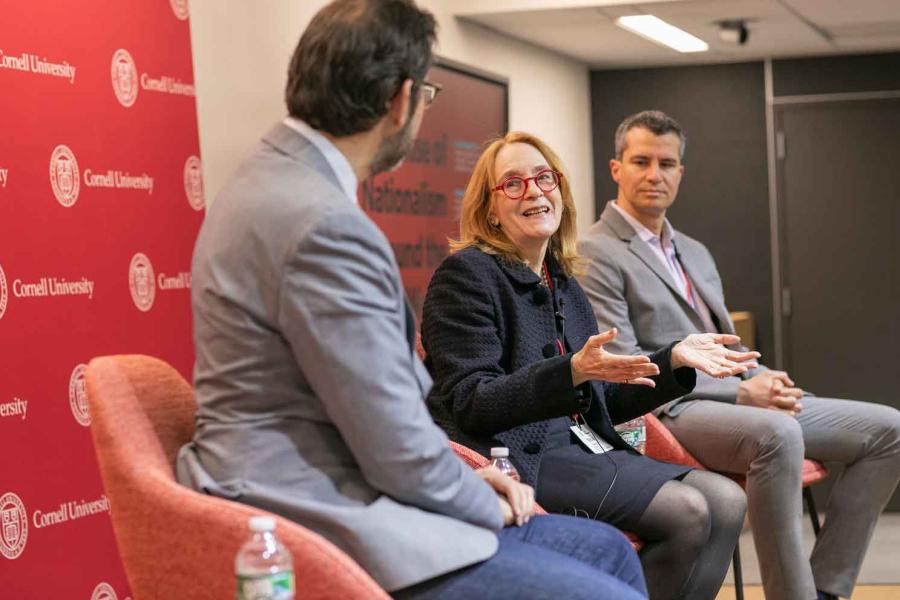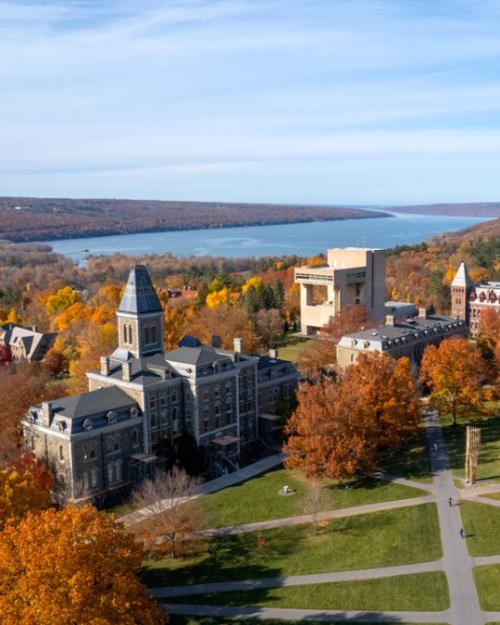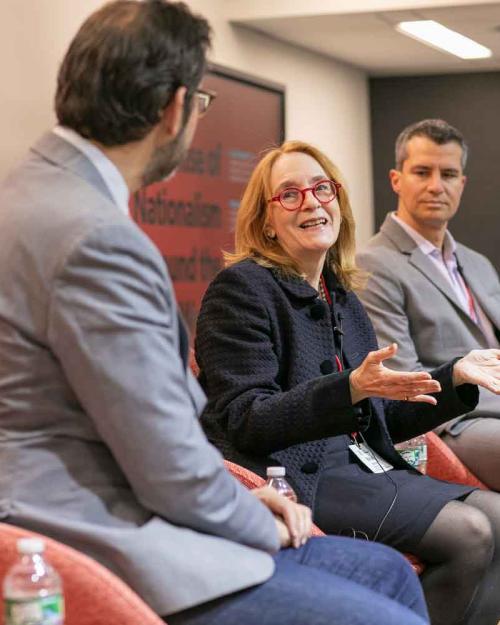Cornell faculty and alumni took part in a wide-ranging discussion focused on nationalism around the world during a March 26 New York City event featuring NPR media correspondent David Folkenflik ’91, the Zubrow Distinguished Visiting Journalist in the College of Arts & Sciences.
The event, held at Cornell’s ILR Conference Center on Lexington Avenue, featured Mabel Berezin, the Distinguished Professor of Arts & Sciences in Sociology (A&S) and director of the Institute for European Studies; and Gustavo A. Flores-Macías, professor of government (A&S) and the acting associate dean of academic affairs in the Brooks School of Public Policy. The panel was organized by the College of Arts & Sciences and the Northeast Corridor Team of Cornell’s Alumni Affairs and Development office.
Berezin’s work focuses on democratic cohesion and solidarity in Europe, while Flores-Macías studies political and economic development in Latin America, so their remarks centered on those global regions. Folkenflik frequently acknowledged echoes between these movements and the rise of nationalism in the U.S.
Flores-Macías began the discussion with an analysis of the current situation in El Salvador, whose recently re-elected president Nayib Bukele has taken away civil liberties and installed a police state in an effort to address an overwhelming rate of violent crime.
Citizens seem to be supportive of the move, which has made the country “as safe as Canada,” Flores-Macías said.
“So many parts of the world live under fear of being victimized day in and day out by violent crime, drug trafficking, gangs and so on,” he said. “El Salvador presented this choice to people: would you rather live in a police state that brings safety or in some form of imperfect democracy where people are always afraid of being victims of crimes?”
Flores-Macías said he’s surprised that El Salvador’s government has managed to maintain such low levels of crime under a state of emergency for more than two years. “But this model is increasingly appealing in the region because so many parts of Latin America are just desperate for a solution that brings some form of order,” he said. In Ecuador, a similar hardline solution seems to be popular with citizens and other countries in the region could be close behind, he said.
In Europe, Berezin said, the progression toward nationalism has been more gradual. “What you’re seeing is parties who are pushing back against the last 20 years of European history, against the Green New Deal, against globalization,” she said. “They want to reinvent the post-war period.”
Berezin shared the story of one of her recent trips to Europe, which was made challenging because of mass protests by farmers upset over higher gas taxes and increased regulations brought about by the Green New Deal.
Throughout much of Europe, Berezin said, the traditional parties on both the left and the right have deteriorated, leaving space for younger parties to grow. And today, some of the right-wing leaders from these parties are starting to form a coalition and work together, she said.
Audience members had many questions for the panelists, asking about differences in the rise of nationalism in Eastern vs. Western Europe and whether there’s a correlation between America’s “meddling” in Latin America and the rise of nationalism there.
“One can trace the deterioration of public safety in El Salvador to the 1980s, when some members of Salvadorian gangs in Los Angeles were deported back to El Salvador,” Flores-Macías said. “This really started the formation of these strong gangs in El Salvador.”
Folkenflik said there are congruences and distinctions amid the various stories about rising nationalism. “It’s interesting to hear about political campaigns keying in on issues of crime, abortion, security and the promise of law and order, reining in intellectuals, checks on executive power. And none of them are taking place in this country,” he said with a laugh.
In a prelude to the discussion on nationalism, Folkenflik spoke on stage for a few minutes with Rachel Bean, interim dean of the College of Arts & Sciences and Jacob Gould Schurman Professor of Astronomy, about his decision to come to Cornell and his time as a reporter and editor with the Cornell Daily Sun.
“I wrote about four humor columns and then the managing editor said they’d teach me how to write a news story,” he said. “I learned how to write and every night there were a bunch of really smart and interesting people hanging out in the Daily Sun offices. Plus, my reporter’s notebook was a passport that allowed me to go into this enormous community [of Cornell and Ithaca] and break it down into parts and understand it.”
“By my senior year, I took my dad around town and I kind of owned it.”






